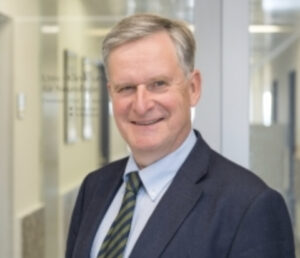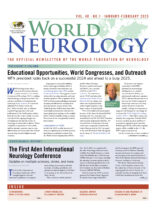Award-winning neurology pioneer and educational proponent was 70.
By Benedikt Schoser, Jan Kuks, and Marianne De Visser

Stephan Zierz
Stephan Zierz, a pioneer in the field of neurology and neuromuscular medicine, was born on July 20, 1954, in Heidelberg, Germany. His father, Prof. Paul Zierz, was a well-known figure in the German Dermatological Society. In 1973, after finishing a classical gymnasium education as secondary school, Stephan Zierz enrolled for medical studies at the University of Giessen, Germany, at the age of 19. In 1980, he completed his medical studies at the University of Giessen and the University of Bonn.
He started his residency in neurology at a small clinic in Klingenmünster, Germany. At the same time, he began his scientific career at the Max Planck Institute in Gottingen (1980-1983). In 1984, he joined the Neuromuscular Research Center as a research fellow at Mayo Clinic in Rochester, Minnesota. Under Dr. Andrew Engel’s supervision, he worked on the biochemical characterization of carnitine palmitoyltransferase II (CPT II), one of the mitochondrial enzymes that catalyze the oxidation of long-chain fatty acids. He generated four scientific papers.
After Mayo, Stephan Zierz joined the University Hospital of Bonn as a physician in 1986 and was promoted to senior physician in 1989. A core trigger element of his career was working with Felix Jerusalem, the most well-known myologist in Germany at that time, who also collaborated with Andrew Engel. In 1990, he completed a post-doctoral teaching degree with a paper titled “Ophthalmoplegia-Plus and Kearns-Sayre Syndrome: Clinic, Biochemistry, and Therapeutic Trials With Coenzyme Q.”
In 1994, he was appointed neurology chair at Martin Luther University Halle-Wittenberg and remained in that position until his retirement in 2021. For several years, Stephan Zierz also served as the dean of the Faculty of Medicine.
Beyond his local and national engagement for neuromuscular disorders, he was an active member of various neurological and neuromuscular societies. He organized neuromuscular sessions at the annual congress of the German Neurological Society. He was a recognized fellow of the European Academy of Neurology. He established cooperation with the Mongolian Neurological Society with annual training events and internship programs for Mongolian doctors in Germany and Mongolia.
For many years, he engaged himself with the Section of Neurology in the Union of European Medical Specialists (UEMS), and he participated as a faithful examiner in the European Board Exam in Neurology. During the UEMS meetings, he was always eager to contribute to the mission of the Section of Neurology to support medical specialists in enhancing their skills and proficiency. After the meeting, he sat with all UEMS delegates and chatted about his encounters and experiences. It was a pleasure to join him at dinner, where classical philosophy and literature were beloved topics. Stephan Zierz was a family man who often brought his daughters — who were also devoted to neurology — along to section meetings.
Stephan Zierz’s impact on the field of neurology and neuromuscular medicine was profound. His research in neuromuscular disorders earned him the highly esteemed lifetime award for a myologist in 2017: the Duchenne-Erb Prize of the German Society of Neuromuscular Disorders. This recognition was a testament to the weight of his contributions and his influence on the field, a source of pride for all who knew him.
Stephan Zierz was an excellent and enthusiastic teacher, supervisor, and author of more than 350 scientific reports and monographs. Many of his papers focused on mitochondrial disorders, addressing their clinical, pathological, histological, biochemical, and molecular genetic aspects.
His unique sense of humor warmly backed his endless enthusiasm, which was linked to his German perfectionism.
Stephan Zierz is sadly missed, but his legacy in international and German neurology and neuromuscular medicine will continue to inspire and guide future generations. •
